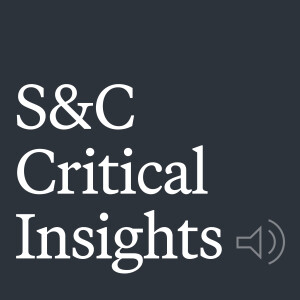
82.1K
Downloads
229
Episodes
Sullivan & Cromwell present the S&C Critical Insights podcast. Topics include M&A trends across industries, corporate governance including shareholder activism, litigation, arbitration, products liability, and more.
Sullivan & Cromwell present the S&C Critical Insights podcast. Topics include M&A trends across industries, corporate governance including shareholder activism, litigation, arbitration, products liability, and more.
Episodes

Friday Mar 21, 2025
Trade Secrets: Strategic Considerations for Litigation (Part 5)
Friday Mar 21, 2025
Friday Mar 21, 2025
In this episode of S&C’s Critical Insights, Annie Ostrager, Co-Head of S&C’s Employment Law Group, Alex Gross, a partner in the Firm’s Litigation Group, and associate Sabrina Solow explore strategic considerations for a company involved in a trade secrets case.
Topics include the role of injunctive relief, the impact of mandatory disclosure regimes and related internal investigations

Thursday Mar 13, 2025
Trade Secrets: A Corporate Protection Strategy (Part 4)
Thursday Mar 13, 2025
Thursday Mar 13, 2025
In this episode of S&C’s Critical Insights, Annie Ostrager, Co-Head of S&C’s Employment Law Group, Alex Gross, a partner in the Firm’s Litigation Group, and associate Sabrina Solow, discuss steps companies can take in the employment context to protect against disclosure of trade secrets.
They explore protections that can mitigate risk when an employee leaves, including electronic measures to limit or disable access to information; policies, procedures, and contractual requirements, such as nondisclosure agreements; and monitoring activities of a competitor who has hired former employees. They also discuss how to limit the risk of new employees bringing trade secrets from their former employer.
Annie, Alex and Sabrina also discuss the importance of training and culture, including reminding employees that they do not own trade secrets they are privy to or contribute to in their work.

Thursday Feb 27, 2025
Trade Secrets: An Interplay Between Trade Secrets and Non-Competes (Part 3)
Thursday Feb 27, 2025
Thursday Feb 27, 2025
In this episode of S&C’s Critical Insights, Annie Ostrager, Co-Head of S&C’s Employment Law Group, Alex Gross, a partner in the Firm’s Litigation Group, and associate Sabrina Solow, explore the interaction between trade secret litigation and non-compete agreements.
They discuss how non-compete provisions in employment contracts can help mitigate the risk of employees taking confidential information to competitors and the challenges associated with enforcing non-competes.
Annie, Alex and Sabrina also cover the concept of “inevitable disclosure” of confidential information, recent court cases related to non-competes and trade secrets, and the implications of the FTC's efforts to invalidate non-compete agreements on a federal level.

Monday Feb 24, 2025
Trade Secrets: The Current Litigation Landscape (Part 2)
Monday Feb 24, 2025
Monday Feb 24, 2025
In this episode of S&C’s Critical Insights, Annie Ostrager, Co-Head of S&C’s Employment Law Group, Alex Gross, a partner in the Firm’s Litigation Group, and associate Sabrina Solow, focus on the current trade secret litigation landscape, including recent decisions in the Second, Third and Seventh Circuits relating to an important measure of damages.

Wednesday Feb 12, 2025
Trade Secrets: An Overview and Relevant Legislation (Part 1)
Wednesday Feb 12, 2025
Wednesday Feb 12, 2025
In this episode of S&C’s Critical Insights, Annie Ostrager, Co-Head of S&C’s Employment Law Group, Alex Gross, a partner in the Firm’s Litigation Group, and associate Sabrina Solow, provide a background discussion on trade secrets. They explore how companies can find themselves involved in trade secret disputes and discuss the relevant statutory framework, including the Uniform Trade Secrets Act and the Defend Trade Secrets Act.
Annie, Alex and Sabrina highlight the importance of understanding both state and federal laws to protect trade secrets and discuss the forms of relief available, such as injunctive and monetary relief.

Monday Nov 11, 2024
Upcoming Supreme Court Argument in NVIDIA Corp. v. E. Ohman J:or Fonder AB
Monday Nov 11, 2024
Monday Nov 11, 2024
In this episode of S&C’s Critical Insights, Jeff Scott and Julia Malkina, Co-Heads of S&C’s Securities Litigation Practice, discuss the upcoming November 13 oral argument in NVIDIA Corp. v. E. Ohman J:or Fonder AB and the potential implications for companies’ securities-litigation exposure.

Tuesday Nov 05, 2024
Upcoming Supreme Court Argument in Facebook v. Amalgamated Bank
Tuesday Nov 05, 2024
Tuesday Nov 05, 2024
In this episode of S&C’s Critical Insights, Jeff Scott and Julia Malkina, Co-Heads of S&C’s Securities Litigation Practice, discuss the upcoming November 6 oral argument in Facebook v. Amalgamated Bank and its implications for companies’ risk disclosures and potential litigation regarding those disclosures. The issue before the Court is whether a company’s risk disclosures are false or misleading when they do not disclose that a risk has materialized in the past—and if so, under what circumstances. Public companies routinely make such risk disclosures, so this case has the potential to have significant effects both on companies’ disclosure practices and potential exposure.

Monday Nov 04, 2024
The Impact of the FTC’s Changes to the Hart-Scott-Rodino Form
Monday Nov 04, 2024
Monday Nov 04, 2024
In this episode of S&C’s Critical Insights, Samantha Hynes, a partner in S&C’s Antitrust Group, and Brad Smith, special counsel in the Antitrust Group, discuss the impact of the Federal Trade Commission’s final rule that made substantial modifications to the form used to report transactions requiring a premerger filing under the Hart-Scott-Rodino Antitrust Improvements Act of 1976. The new form will require substantially more information and documents than are currently required.

Friday Oct 11, 2024
Friday Oct 11, 2024
In this episode of S&C’s Critical Insights, S&C litigation partner John Hardiman discusses Vice Chancellor J. Travis Laster’s recent ruling in Sarah Clement v. Apollo Global Management and its implications for controlling shareholders in M&A transactions. Despite the Delaware Chancery Court’s intense scrutiny of transactions involving controlling shareholders, the Court gave the controller a rare win and dismissed a complaint alleging that a merger was unfair because the controller allegedly extracted unique benefits to the determinant of minority shareholders. Along the way, the court also elaborated upon two issues of Delaware “unique benefit” law in controlling stockholder transactions of interest to Delaware practitioners: (i) whether the unique benefit received by the controller has to be at the expense of the minority; and (ii) the framework for analyzing challenges to a merger where the claimed benefit is the elimination of litigation exposure.

Wednesday Oct 09, 2024
Lessons from the 2024 Proxy Season, Part 2
Wednesday Oct 09, 2024
Wednesday Oct 09, 2024
In this episode of S&C’s Critical Insights, Corporate Governance Co-Heads Marc Treviño and Melissa Sawyer and Special Counsel June Hu continue to analyze significant trends and developments that emerged from the recent U.S. annual meeting proxy season and provide takeaways for 2025.
